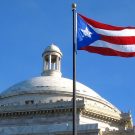Whither Puerto Rico?
Is there any salient public policy issue that the Supremes are not going to rule on this Term? And: are the Justices entirely sure how to think about highly salient cases where ideological preferences and deeply held jurisprudential convictions cut against and across each other—and where there’s a real premium on sorting things out? Check out last week’s oral argument in Bank Markazi (I’ve noodled over the case here ): goodness. You’ll find almost every justice on both sides of the argument; and you can make a good case that this beast was lost in oral argument whichever way this comes out. (The colloquy between the Chief and Ted Olsen is priceless.)
Here’s another good one: the status, and the fate, of Puerto Rico. It’s at issue in two subtly and not-so-subtly connected cases.
This week, the Court heard oral argument on the question whether Puerto Rico is a “state” for purposes of the Double Jeopardy Clause (Puerto Rico v. Sanchez Valle). You can be convicted for the same offense under state and federal law, because those laws come from different sovereigns. But is that true of Puerto Rico—or is the ultimate authority of its laws the U.S. Congress?
Obviously, Puerto Rico’s counsel (Chris Landau) conceded, the place isn’t a state. But it’s enough like a state to be treated like one, for purposes at hand. He didn‘t get very far with that argument, chiefly because the constitutional counterargument is so obvious: Something is either a state, or it isn’t. If it isn’t (but still belongs to the United States), it must be a territory. Putting aside the District of Columbia and the Indian nations, both specifically mentioned in the Constitution, “state” and “territory” are mutually exclusive—and they exhaust the universe. Congress can make all “needful regulations” with respect to territories and grant them a great deal of autonomy. Congress can make territories into states, or grant them independence. It can even tell the UN, as it has, that Puerto Rico isn’t a colony but kinda, sorta self-governing. (Justice Breyer made a big point of that.) None of those powers, however, can possibly encompass the power to make these places into constitutional mutts.
Next case: whatever Puerto Rico may be, it’s an economic basket case: deeply in debt, with no prospect of paying its obligations or debts of its public utilities. If Puerto Rico were a state, its subunits (though not the state itself) could restructure its debts under Chapter 9 of the federal Bankruptcy Code—just like Detroit (San Juan without the beaches). But it isn’t, and so they can’t: a provision in a bankruptcy statute enacted in 1984 says explicitly that Puerto Rico shall not be deemed a “State” for these purposes. But the thing is, Chapter 9 governs preemptively and exclusively. And that in turn means that a Puerto Rico “Recovery Act,” enacted in 2014 to unload (abrogate, restructure—take your pick) the Commonwealth utilities’ debt is, well, preempted. So said the First Circuit, in a case on which the Court has recently granted cert (Puerto Rico v. Franklin California Tax-Free Trust).
Is there some connection between the cases? Technically, not necessarily: the bankruptcy case is fairly straight-up statutory interpretation. But the idea that there might be an overlap—at least atmospherically—surely occurred to Mr. Landau (who represents the Commonwealth in both cases), and the bankruptcy issue was almost certainly on the justices’ minds in this week’s oral argument. An amicus brief by Puerto Rico’s Senate President goes further. “If Puerto Rico is treated like a State within the economic sphere of the Commerce Clause,” it says, “it also befits that it be treated akin to a State under the fiscal scope of the Bankruptcy Clause.” The problem at hand, says the brief, is “best resolved by reinserting Puerto Rico back in the Bankruptcy Code.” Of course, Congress could do that any day of the week. But the brief urges the Court to take that step “on constitutional grounds.” What grounds? Well, the proviso that bankruptcy rules must be uniform. (Yes: among states.) And maybe equal protection. Or something.
That isn’t going to go anywhere—I hope. Whatever the justices decide to say or do about Puerto Rico’s status, it’s important to keep the differences between the Commonwealth and bona fide states in mind, especially for debt relief purposes. As Alex Pollock (among others) have observed, a federally sponsored work-out for Puerto Rico (as well as its utilities) should be engineered and overseen by an outside board; and it might and probably should entail massive changes in Puerto Rico’s governing institutions and structures. Also, let’s throw the rascals out. The whole deal has to be sufficiently painful to combat moral hazard and to discourage a prompt relapse.
Could we, should we, would we do something like that to and for Illinois if and when it and its creditors come begging? No way, no how. For good or ill it’s a state. It can govern itself like Puerto Rico. Congress can’t.


